Summer attack of neo-Trudeaumania .. all just a sign of perfect storm to come?
Jul 15th, 2006 | By Dominic Berry | Category: Ottawa Scene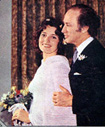 Some will ask why? During the second full week of July 2006 both Trudeau brothers were in the Canadian news. Justin is about to start a new acting career. And Alexandre is going to become a father (having first met the mother in question through his new sister-in-law, Sophie Gregoire). Others will say that paid publicists somewhere in darkest Canada are just doing their jobs. In the middle of the same week CBC TV ran the first installment in a repeat of Trudeau II: The Maverick Years – the story of Justin and Alexandre’s father, Pierre, before he became prime minister of Canada (and first released last fall 2005, to bad ratings but rather good reviews).
Some will ask why? During the second full week of July 2006 both Trudeau brothers were in the Canadian news. Justin is about to start a new acting career. And Alexandre is going to become a father (having first met the mother in question through his new sister-in-law, Sophie Gregoire). Others will say that paid publicists somewhere in darkest Canada are just doing their jobs. In the middle of the same week CBC TV ran the first installment in a repeat of Trudeau II: The Maverick Years – the story of Justin and Alexandre’s father, Pierre, before he became prime minister of Canada (and first released last fall 2005, to bad ratings but rather good reviews).
Justin as a thespian (i.e. actor) …
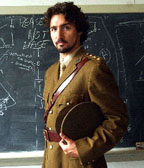 Starting the week of July 17, 2006, Justin Trudeau – eldest son of former Canadian prime minister Pierre Trudeau – will be acting in a CBC TV drama on The Great War (a.k.a. the First World War, 19141918), directed by Brian McKenna. The four-hour series will be broadcast in April 2007, during the 90th anniversary of the battle of Vimy Ridge.
Starting the week of July 17, 2006, Justin Trudeau – eldest son of former Canadian prime minister Pierre Trudeau – will be acting in a CBC TV drama on The Great War (a.k.a. the First World War, 19141918), directed by Brian McKenna. The four-hour series will be broadcast in April 2007, during the 90th anniversary of the battle of Vimy Ridge.
Justin Trudeau will be playing the “part of war hero Talbot Papineau … a dashing Quebecker who was bicultural, bilingual, charismatic, a foe to Quebec nationalism and a visionary for Canada. In fact, he’s been dubbed the Pierre Trudeau of his time.”
According to the Globe and Mail, Talbot Papineau “was the great-grandson of patriote Louis-Joseph Papineau and cousin to one of Quebec’s greatest nationalist thinkers, Henri Bourassa. Son of an anglophone mother and francophone father, Mr. Papineau became a Rhodes scholar and joined the war effort, where he rose to rank of major … Mr. Papineau came to defend Canada’s role in the war and, in echoes of Mr. [Pierre] Trudeau’s vision many generations later, promoted the idea of English and French Canadians fighting side-by-side for a common purpose. In doing so, he became an outspoken opponent to Mr. Bourassa – much like Mr. Trudeau duelled with Parti Qubcois leader Ren Lvesque decades later.”
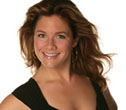 Mmmm … There are also historians who will tell you that Pierre Trudeau’s vision of Canada actually had quite a lot in common with the vision of Henri Bourassa – who was not really any exact analogue for “Ren Lvesque decades later.” And, as is somewhat more widely appreciated, Pierre Trudeau did not exactly believe in “the idea of English and French Canadians fighting side-by-side” during the Second World War (at least insofar as this involved Pierre Trudeau himself). But such more exact details are perhaps mere trifles at the CBC.
Mmmm … There are also historians who will tell you that Pierre Trudeau’s vision of Canada actually had quite a lot in common with the vision of Henri Bourassa – who was not really any exact analogue for “Ren Lvesque decades later.” And, as is somewhat more widely appreciated, Pierre Trudeau did not exactly believe in “the idea of English and French Canadians fighting side-by-side” during the Second World War (at least insofar as this involved Pierre Trudeau himself). But such more exact details are perhaps mere trifles at the CBC.
Meanwhile, impersonating Talbot Papineau on TV will be the 34-year-old Justin Trudeau’s first venture in professional acting – though he “took a voice and speech class while studying English literature at McGill University in the early ’90s” and “then taught drama, along with English and math, to high-school students in Vancouver.” Justin has told the press “I’m just excited about it. This is something completely new for me – and geez, I hope I don’t suck.”
The hope is probably shared by Brian McKenna and the CBC. The rest of us will have a chance to judge for ourselves next April.
Latest news about Alexandre (a.k.a. Sacha) and Zoe Bedos …
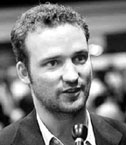 Meanwhile again, a very short and to the point July 13 Canadian Press report on Justin Trudeau’s younger brother is worth quoting in full:
Meanwhile again, a very short and to the point July 13 Canadian Press report on Justin Trudeau’s younger brother is worth quoting in full:
“MONTREAL – Former prime minister Pierre Trudeau’s son Alexandre is preparing to become a father, Montreal’s La Presse reported today.
“The documentary filmmaker said in an interview that his girlfriend is three-months pregnant and the couple hasn’t yet learned the sex of the child.
“Frederic Berard, one of Trudeau’s best friends, said Alexandre and his family are very excited about the birth.
“His mother, Margaret, has never hidden how much she wants to be a grandmother,’ Berard said.
“Trudeau and Zoe Bedos have been together for a few months. She was apparently introduced to Alexandre by Sophie Gregoire, wife of Trudeau’s older brother Justin.”
Trudeau II: The Maverick Years … the usual question: is it really any good?
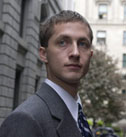 It can’t of course be true that these two conceivably seminal events in the lives of Justin and Alexandre Trudeau were just dreamt up by CBC publicists, to help promote the re-run of Trudeau II: The Maverick Years on the evening of Thursday, July 13, 2006. (This was just the first installment: the second will air Thursday, July 20.)
It can’t of course be true that these two conceivably seminal events in the lives of Justin and Alexandre Trudeau were just dreamt up by CBC publicists, to help promote the re-run of Trudeau II: The Maverick Years on the evening of Thursday, July 13, 2006. (This was just the first installment: the second will air Thursday, July 20.)
But if you missed the original showing of this mini-series last October – thus helping to account for the low ratings – Justin and Alexandre’s coterminous appearance in the news might at least have drawn your attention to the story of their father’s early years, long before he became Canada’s unambiguously most interesting prime minister.
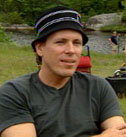 The original CBC Trudeau mini-series (or “Trudeau I” if you like) did deal with the actual prime ministerial era, and was widely judged quite a triumph – at least by people who still watch the CBC. So just how good is Trudeau II anyway?
The original CBC Trudeau mini-series (or “Trudeau I” if you like) did deal with the actual prime ministerial era, and was widely judged quite a triumph – at least by people who still watch the CBC. So just how good is Trudeau II anyway?
Our counterweights focus group found it easier to follow and make sense of the first installment if you read “Chapter 2: The Formative Years” of Stephen Clarkson’s and Christina McCall’s Trudeau and Our Times – Volume 1: The Magnificent Obsession at the same time. But having done this while the show was running, it is hard to subsequently remember just what you learned from the book and what you learned from the TV.
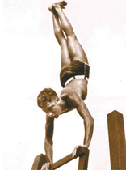 In neither place of course are there any hints on the latest big news we have discovered about the early Pierre Trudeau – in Max and Monique Nemni’s new book, Young Trudeau: Son of Quebec, Father of Canada, 1919-1944. Which, put a bit melodramatically perhaps, “reveals that as a youth and young man, Mr. Trudeau was an anti-Semite, admired fascist dictators such as Hitler and Mussolini, promoted revolution and longed for an independent and Catholic Quebec that would be home only to francophones.”
In neither place of course are there any hints on the latest big news we have discovered about the early Pierre Trudeau – in Max and Monique Nemni’s new book, Young Trudeau: Son of Quebec, Father of Canada, 1919-1944. Which, put a bit melodramatically perhaps, “reveals that as a youth and young man, Mr. Trudeau was an anti-Semite, admired fascist dictators such as Hitler and Mussolini, promoted revolution and longed for an independent and Catholic Quebec that would be home only to francophones.”
In any case, it would seem to have been the young Pierre Trudeau’s academic studies abroad, after the Second World War, in Boston, Paris, and London, that started to shape the man who finally became Canada’s most interesting prime minister in 1968. And we know that by 1952, in his early 30s, he had attended “an economic conference in the Soviet Union,” where in “an infantile desire to shock,” he “told the wife of U.S. charg d’affaires Hugh Cumming that he was a Communist and a Catholic, then went on to criticize the U.S. and praise the Soviet Union.”
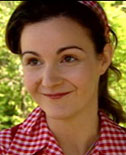 (All of which prompted the Canadian diplomat father of current Liberal leadership candidate Michael Ignatieff to explain to the US State Department that the still “young and adventurous” Pierre Trudeau was just “a showoff” and “an individual not possessing much common sense.” Politically, by the early 1950s he was “an individual of neutralist sentiments,” whatever that may imply, but “not considered a security risk in Ottawa” – even though he had been briefly “formerly employed in the Privy Council’s Office … in a minor capacity.”)
(All of which prompted the Canadian diplomat father of current Liberal leadership candidate Michael Ignatieff to explain to the US State Department that the still “young and adventurous” Pierre Trudeau was just “a showoff” and “an individual not possessing much common sense.” Politically, by the early 1950s he was “an individual of neutralist sentiments,” whatever that may imply, but “not considered a security risk in Ottawa” – even though he had been briefly “formerly employed in the Privy Council’s Office … in a minor capacity.”)
What both Trudeau II and the Clarkson-McCall book do make clear enough, even without anything of the Nemnis’ latest discoveries woven in, is that Pierre Elliott-Trudeau (as he did at one point call himself, with the hyphen included), had a quite turbulent and intriguing extended rich-boy’s adolescence, that is full of hints about why the unusual man who rather improbably became prime minister of Canada in his late 40s was the way he was.
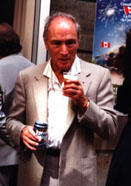 As for how good Trudeau II really is, Pulp and Dagger Fiction’s Great Canadian Movie Guide gives it three and a half stars, and says: “this prequel, surprisingly, emerges as genuinely compelling, benefitting precisely because it’s less familiar territory. Avoids some of the cartoony, simplified didacticism of some bio-pics with its warts and all portrait, showing Trudeau’s intelligence and idealism, but also his pettiness, arrogance, social awkwardness, and more. It’s more personal and character-focused than the previous mini-series, but also, ironically, more political, and maybe a slightly more mature, complex film than the original.”
As for how good Trudeau II really is, Pulp and Dagger Fiction’s Great Canadian Movie Guide gives it three and a half stars, and says: “this prequel, surprisingly, emerges as genuinely compelling, benefitting precisely because it’s less familiar territory. Avoids some of the cartoony, simplified didacticism of some bio-pics with its warts and all portrait, showing Trudeau’s intelligence and idealism, but also his pettiness, arrogance, social awkwardness, and more. It’s more personal and character-focused than the previous mini-series, but also, ironically, more political, and maybe a slightly more mature, complex film than the original.”
(A final poll of our own counterweights focus group voted to essentially agree with this judgment – while underlining “some of the cartoony, simplified didacticism,” and “a slightly more mature, complex film.” As the recent public controversy over the portrayal of former Saskatchewan premier Jimmy Gardiner in Prairie Giant: The Tommy Douglas Story brought home so nicely, the CBC nowadays does sometimes seem a little too willing to sacrifice any conception of truth in advertising to its own unique larger political understandings of the national interest. Our focus group did feel that Trudeau II would have been somewhat better if this local disease were finally conquered, and banished from the peaceable kingdom altogether.)
Pierre Trudeau’s curious appearance in Mark Milke’s new book …
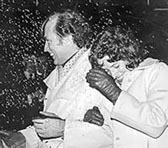 Western Canada, some still say, never did quite warm to Pierre Trudeau as Eastern Canada did (though even in the east “warmth” is probably not exactly the right word either). But when you dig a little deeper, it is easy enough to suspect that this is only half true at best.
Western Canada, some still say, never did quite warm to Pierre Trudeau as Eastern Canada did (though even in the east “warmth” is probably not exactly the right word either). But when you dig a little deeper, it is easy enough to suspect that this is only half true at best.
To start with, after he became prime minister Pierre Trudeau in his early 50s married Margaret Sinclair in her early 20s from beautiful BC. (As George Ignatieff had told the US State Department not quite 20 years before, Pierre was “an individual not possessing much common sense.”) Margaret lives in Ottawa nowadays, but both her surviving Trudeau sons still have their own connections with Canada’s Pacific Coast. Pierre’s old white Mercedes convertible, which Justin Trudeau and his new bride Sophie Gregoire drove away from their discreetly publicized Montreal wedding in last year, had just been restored at a garage in BC, etc, etc …
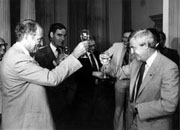 Even in the ostensibly much less Trudeau-friendly climate across the mountains in Alberta, you could always tell on TV that former Alberta premier Peter Lougheed, e.g., harboured some real admiration and respect for his Ottawa rival of the day – even as he frequently disagreed with his national policies. (Pierre Trudeau’s bon-vivant and highly entrepreneurial father Charlie, who wound up owning a lot of gas stations in Quebec, could conceivably be a big a hit in Calgary today. And if Pierre was more like his mother, his father had taken pains to ensure that there was enough of him in the future prime minister too.)
Even in the ostensibly much less Trudeau-friendly climate across the mountains in Alberta, you could always tell on TV that former Alberta premier Peter Lougheed, e.g., harboured some real admiration and respect for his Ottawa rival of the day – even as he frequently disagreed with his national policies. (Pierre Trudeau’s bon-vivant and highly entrepreneurial father Charlie, who wound up owning a lot of gas stations in Quebec, could conceivably be a big a hit in Calgary today. And if Pierre was more like his mother, his father had taken pains to ensure that there was enough of him in the future prime minister too.)
You can still see some of this not-so-secret Alberta romance with Pierre Elliott Trudeau at work nowadays – in e.g., a June 13, 2006 column by Paul Johnson in the Calgary Sun, which began with: “I asked author and commentator Mark Milke whether he believes Canada is truly a dysfunctional nation … The question followed a reading of his compelling new book A Nation of Serfs: How Canada’s Political Culture Corrupts Canadian Values (Wiley, $22.99) and a chat in which he repeatedly used the word absurd’ to describe much of our nation’s political, economic and social culture.”
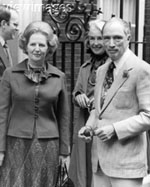 Mark Milke, Mr. Johnson went on, views the current new Conservative prime minister of Canada, Stephen Harper “as a leader such as Reagan and Thatcher – and curiously Trudeau – who were always thinking 20 steps ahead and so forced … opponents to fight on ground unfavourable to them … Basically, the opponents were always in a defensive position … Reagan, Thatcher and Trudeau were on the offensive … Milke contends there is now a tectonic shift’ under way in our country in which, paradoxically, discontent in Alberta and Quebec, Ontario and British Columbia, will create the perfect storm’ that will realign our nation.”
Mark Milke, Mr. Johnson went on, views the current new Conservative prime minister of Canada, Stephen Harper “as a leader such as Reagan and Thatcher – and curiously Trudeau – who were always thinking 20 steps ahead and so forced … opponents to fight on ground unfavourable to them … Basically, the opponents were always in a defensive position … Reagan, Thatcher and Trudeau were on the offensive … Milke contends there is now a tectonic shift’ under way in our country in which, paradoxically, discontent in Alberta and Quebec, Ontario and British Columbia, will create the perfect storm’ that will realign our nation.”
Mmmm again … Now just what might that mean? While we’re all trying to figure this out, on a very hot summer weekend in the true north strong and free, here are two final intriguing quotations about Pierre Trudeau that someone has cleverly put on some Wikipedia site …
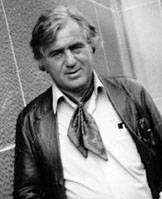 The first is from John Lennon (and probably makes about as much sense as many other things John Lennon said): “If all politicians were like Pierre Trudeau, there would be world peace.”
The first is from John Lennon (and probably makes about as much sense as many other things John Lennon said): “If all politicians were like Pierre Trudeau, there would be world peace.”
The second is from Irving Layton – recently described by Leonard Cohen on US TV as “our finest poet in Canada” or some such thing. Like Cohen, Irving Layton grew up in more or less the same Montreal that gave the world Pierre Trudeau. In an earlier era Leonard Cohen and the considerably older Irving Layton were always strategically complimenting each other in public. And the part about “our finest poet in Canada” should probably be taken in this context. But Irving Layton did sometimes say some interesting things rather nicely – including, apparently: “In Pierre Elliott Trudeau, Canada has at last produced a political leader worthy of assassination.”


[…] Trudeau’s father, former Prime Minister Pierre Trudeau, had held rather radical views in his youth. Typical of the days of his youth and education (1930s to early 1940s) he held views which included […]
[…] Trudeau’s father, former Prime Minister Pierre Trudeau, had held rather radical views in his youth. Typical of the days of his youth and education (1930s to early 1940s) he held views which included […]